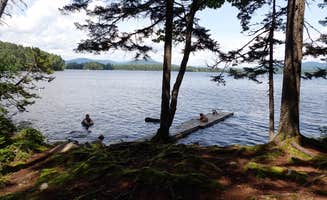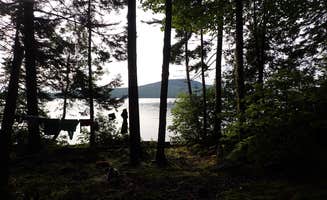Primitive camping near Pittsburg, New Hampshire offers secluded options along the Connecticut River watershed and in surrounding wilderness areas. Most sites are accessible via unpaved forest roads with varying conditions depending on recent weather. Winter access is extremely limited, with most remote sites closed by snow from November through April.
What to do
Boat fishing access: The primitive sites along Cupsuptic Lake provide excellent fishing opportunities with dock facilities. "There is a nice long dock that makes it super easy to boat into and unload. You can also backpack in and enjoy some pretty cool Maine forests along the way. There is also relatively easy access to the water by way of the rocks, beside the dock," notes camper Sarah C.
Swim in natural settings: The Dead River area near Trout Brook Campground offers swimming in a remote setting. "This location is Beautiful, but it comes at the cost of privacy," explains Miccal M. The swimming areas here lack lifeguards or designated swimming zones, so caution is advised, especially with children.
Wildlife observation: Cupsuptic Lake has active loon populations visible from shoreline sites. "These sites are secluded and offer a lovely amount of privacy and rest assured, the only sounds you will hear at night are the loons!" reports a visitor to Smudge Cove. Early mornings and dusk offer optimal viewing conditions.
What campers like
Scenic views: The Scott C. Devlin Memorial site provides elevated forest views above the Connecticut River. "It is well maintained and tucked on a knoll in a pine forest. There is a picnic table, fire ring and composting toilet box seat," writes Sarah C. The site positions campers among mature pines with river access.
Water access: Many campers appreciate the direct water approaches at Connecticut River sites. "There is a set of wooden steps that go down into the water at a relatively steep angle. Be sure you tie your boat up while unloading as there is a fair amount of current sweeping around the bend," advises a paddler about the Scott C. Devlin site.
Quiet seclusion: Hogan Road Pulloff offers notable isolation from other campers. One visitor reports: "amazing lil spot, a pull off the wild rocky road. very private. right next to a serene view of the lake. very mild highway traffic sounds in the distance." This site accommodates multiple tents while maintaining separation from main roads.
What you should know
Road conditions: Access routes to primitive sites vary significantly in quality. Dominique F. notes about Hogan Road Pulloff: "About 1km (.6 miles) of gravel road, easy enough for a big road bike, but don't go any further as it gets rough." For Trout Brook Campground, Chris T. reports: "Road is passable for most any vehicle. Not larger RV friendly but was comfortable enough to get the 27' foot trailer in."
Site availability: Most primitive sites operate on first-come, first-served basis with no reservation systems. Sites fill quickly on summer weekends and during fall foliage season. The CT River Paddlers Trail requests voluntary registration to prevent overcrowding.
Drainage concerns: Primitive sites lack grading or drainage infrastructure. "We stayed here during a torrential downpour and it was tough to find a spot to pitch the tent that wasn't going to put us in a puddle," reports a camper at Eagle Cove. Similarly, another camper noted Raven campsite "was a literal mud pit" after rain.
Tips for camping with families
Site selection: Choose sites with established facilities when camping with children. "There are 4 sites, 3 have no separation between them, 1 is at the entrance, all are on the access road with 0 privacy," warns Miccal M. about Trout Brook Campground. Families may prefer sites with picnic tables and toilet facilities.
Wildlife precautions: Families should properly store food as black bears are active throughout the region. Multiple campers report high tick concentrations, particularly in grassy areas. "Beware the ticks! They weren't the worse I've seen, but they are definitely around," notes one visitor to the Maine Railroad Trestle site.
Activity planning: Bring water toys and fishing gear for lake sites. Many primitive campsites have limited flat areas for games or activities. Linda C. from Trout Brook Campground suggests weekday visits for families: "You're camping close to others but it was quiet at night when we were there mid-week."
Tips from RVers
Size limitations: Most dispersed camping areas near Pittsburg restrict vehicle size. "Not larger RV friendly but was comfortable enough to get the 27' foot trailer in," reports Chris T. about Trout Brook Campground. Larger motorhomes should avoid forest roads to prevent damage or getting stuck.
Supply preparation: No hookups or services exist at primitive sites. RVers must arrive fully stocked with water, fuel, and supplies. The Rangeley-Stratton Road Camp sites require complete self-sufficiency, with no water, toilets, or waste facilities available.
Parking considerations: Limited turning space exists at most sites. One camper at Hogan Road notes: "Enough space to put up to 3-5 tents." Larger vehicles should scout sites before attempting access, as backing out on narrow forest roads can be difficult.







